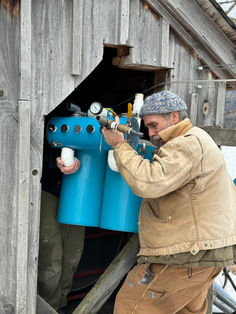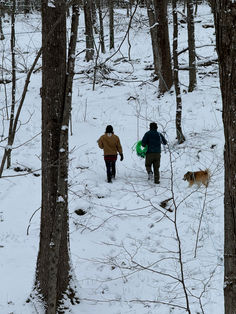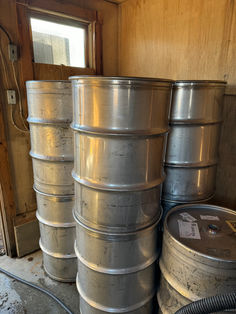Living Lab
Climate Adaptive Maple Program
Summary & Purpose
This long-term research and education program was launched in 2024 to address the challenges the maple syrup industry is facing associated with increased climate change impacts. In 2025, two research and demonstration sugarbushes (R&D Sugarbushes) will be set up to collect sap from over 7,000 trees across Smokey House Center’s valley. These tubing systems will be laid over distinct silviculture treatments that will allow collaborating researchers to to track the long-term impacts of these treatments on sugarbush health and production. The program will also support regional producers, foresters, and youth by hosting annual field workshops, sharing research findings, and hosting an annual youth maple apprenticeship program during the sap season.
Project Objectives:
-
Launch long-term applied research program that addresses two critical questions maple syrup producers are currently facing:
-
How do different climate-adaptive forest management strategies impact the long-term production and resilience of sugarbushes?
-
How do various sap extraction techniques affect the long-term ability of sugarbushes’ to respond to climate disturbances while maintaining syrup yields?
-
-
Train diverse cohorts of current and next generation of maple industry professionals in climate adaptive management strategies.
-
Publish research findings that inform policy recommendations and other forms of support that empower maple producers to adopt practices that help their operations adapt and thrive in the face of climate change.
Partners
Joe Orefice, Director, Yale Forest, Yale School of the Environment; Lee Allen, Emeritus C.A. Schenck Distinguished Professor of Forestry and Emeritus Director of Forest Productivity Cooperative, North Carolina State University, Tony D'Amato and Ali Kosiba from the University of Vermont Rubenstein School of Environment, Glenn Goodrich of Goodrich Maple Farm, Peter Smallidge from Cornell's Arnot Forest.
Forest Farming & At-Risk Plant Propagation
Summary & Purpose
Forest farming is an agroforestry practice with roots in indigenous plant traditions that involves growing and stewarding non-timber forest products (NTFPs) under forest canopies. It can increase economic resilience for farms by diversifying income streams while helping to restore at-risk plant species and keep our forest as forest. Through its ongoing partnerships with the Yale School of the Environment and Northeast Forest Farmers Coalition, and with continued financial support through the Northeast Sustainable Agricultural Research and Education (SARE) program, Smokey House Center continues to be a regional hub for applied forest farming research and education.
Project Objectives:
-
Develop new strategies for providing planting stock of commercially valuable and at-risk native forest plants such as ginseng, ramps, and goldenseal.
-
Help create a grassroots network of forest botanical nurseries in the region by training a new generation of at-risk forest botanical propagators.
-
Conduct research and education that better informs best practices, policy recommendations, and the advancement of a socially and ecologically beneficial forest farming industry in the Northeast.
Partners
Yale School of the Environment; Northeast Forest Farmers Coalition (NFFC)
Community Science and Recreation Planning Project
Summary & Purpose
Funded by a Vermont Outdoor Recreation Economic Collaborative (VOREC) Grant, this project is developing a community-informed plan for revitalizing Smokey House’s degraded trail system to become a dynamic platform for community science. This work will increase access to a spectrum of meaningful recreation opportunities for key community groups like Danby residents and local youth. Community members will help track long-term ecological changes from climate change and other impacts that will be utilized by Living Lab researchers. In turn, outdoor recreation will be a key mechanism for accomplishing the research goals of Smokey House’s Living Lab program while building a sense of shared community stewardship and connection to the landscape.
Project Objectives:
-
Revitalize Smokey House Center’s degraded trail system to increase recreational opportunities for local and regional community groups.
-
Launch a community science program that empowers local community members to actively contribute to Living Lab research through trail-based data collection.
-
Provide a land-based case study in exploring how recreation opportunities can be designed to support community-based participatory research and stewardship of place.
Partners
VT Center for Ecostudies; UVM Extension; Strength Perspectives; Vermont Youth Conservation Corps; Sinuosity
Green Building & Local Wood Economies Project
Summary & Purpose
Through support provided by the Northern Border Regional Commission (NBRC), the Green Building & Local Wood Economies Project brings together a coalition of foresters, architects, green builders, and other industry professionals to research, design, and build a pilot housing structure at Smokey House Center that demonstrates how our green building practices can better utilize local wood sourced from climate adaptive forest management strategies. The project will explore the use of regionally-supplied and innovative wood products that contribute less embodied carbon emissions and sequester more carbon in buildings than more traditional materials like steel and concrete. Every step of the project is designed to offer educational demonstrations for the industry and the general public and participation by local youth.
Project Objectives
-
Build a pilot housing structure at Smokey House Center that demonstrates innovative local wood use in green building design.
-
Train current and next generation of foresters, architects, and builders in practices that promote a synergistic and reciprocal relationship between the building industry and sustainable forest products industry.
-
Publish a report with research findings, industry recommendations, lessons learned, and next steps that will promote replication of pilot structure and increased local wood use throughout the region.
Partners
Healthy Materials Lab at Parsons School of Design, New Frameworks, University of Vermont Rubenstein School of Natural Resources, Vermont Green Building Network, Vermont State University, Vermont Sustainable Jobs Fund
Sustainable Ramp Management
Summary & Purpose
Ramps (Allium tricoccum) are a wild edible allium species that grow naturally in rich hardwood forests. Humans have long harvested ramps in the springtime for both personal consumption and sale, but more information is needed on sustainable harvesting practices to ensure the long-term survival of these culturally and ecologically significant plants. Starting in the spring of 2024, local school groups participated in a long-term ramp management study aimed at bettering understanding best practices for ramp stewardship. Students not only learn about ramp ecology and management, but work alongside Smokey House staff to measure research plots and establish new ramp populations through transplanting.
Project Objectives:
-
Engage school children directly in cross-generational climate work and research at Smokey House Center to inspire meaning and hope while offering pathways to lives of improved health and purpose.
-
Collect long-term data on existing and newly established ramp populations at Smokey House Center that help inform best management practices for ramp stewardship.
-
Help promote a sustainable ramp industry that empowers forestland owners to keep forest as forest through diversified income streams.
Partners
Currier Memorial Elementary; Burr and Burton Academy; Dorset School; Long Trail School; Red Fox Community School, Manchester Elementary Middle School, Mettawee Community School
All About Wild Apples!
Summary
Through working with local school groups, SHC is cataloging and mapping the many wild apple varieties growing across our 5,000 acres to try to identify new apple varieties that are both productive and resilient to increased climate impacts like drought, disease, and early frost. Starting in the fall of 2024, students helped collect different apple varieties and characterized key traits such as taste, texture, appearance, and sugar content through taste tests. This data helps Smokey House staff identify hardy and productive apple varieties endemic to the valley that could eventually be grown out and distributed to regional growers.
Project Objectives
-
Engage school children directly in cross-generational climate work and research at Smokey House Center to inspire meaning and hope while offering pathways to lives of improved health and purpose.
-
Catalog and characterize traits of the dozens of wild apple varieties growing across Smokey House Center. Identify varieties with favorable traits like flavor, texture, disease resistance, late blossom time, etc. Take genetic samples of best apples to map genome and ancestral lineage.
Partners
Currier Memorial School, Sunderland Elementary, Flood Brook School, Northshire Day School, Long Trail School, Dorset School, Maple Street School, and Red Fox Community School
Interested in doing research at Smokey House Center?
Contact Walker Cammack
Program Director
Living Lab at Smokey House Center

























































































